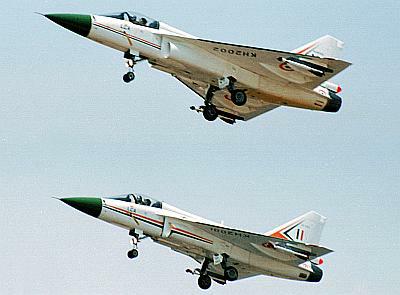|
| Help | |
| You are here: Rediff Home » India » News » First Look |
|
|
February 11, 2009
After over 1,000 hours of test flights over several years, the Tejas was checking out its teeth and claws by dropping bombs on a ground target. Group Captain R Tyagi, in the lead Tejas, was to fly several hundred kilometres and attack a ground target. The tarmac outside his air-conditioned cockpit was blistering, as his onboard health-monitoring systems conducted self-checks, a crucial six-minute operation to ensure that his engines, controls and electronics were functioning normally. Just metres away, naval test pilot Captain Jaideep Maolankar, sat in another Tejas fighter, carrying out the same checks. Jaideep would perform the role of "chase aircraft", flying alongside Tyagi's aircraft and observing every step of the mission. In addition, a high-speed camera was tracking Tyagi's bomb pod, clicking hundreds of frames every second. With a surprising lack of fuss, the two aircraft revved up their engines and taxied out to the runway. I put my hands over my ears as the fighter engines roared into a crescendo and both the aircraft took off, first Tyagi and then Maolankar in quick succession, banking to the right and then quickly out of sight. The pilots were now physically alone in their cockpits, but they had lots of company over the radio. At the end of the runway was the Telemetry Centre of the National Flight Test Centre (NFTC), tracking every moment of the mission. Each aircraft, from the time it started up, was being monitored in detail, the data transmitting live from the aircraft over a high-speed data link. Eleven critical aircraft systems, such as the fuel system, hydraulics and flight controls, were being watched by eleven engineers, each responsible for one particular system. "It's a bit like Formula One racing," explained Wing Commander Aslam Khan, the test director. "The driver, or in this case the pilot, is concentrating too hard on his mission to worry about how the aircraft systems are doing, or about what is happening outside. So we watch those and tell the pilot over radio." As the two Tejas aircraft approached the range, the Telemetry Centre cleared Group Captain Tyagi to release his weapons. Flying just 70 metres away, Captain Maolankar watched carefully as Tyagi's bombs were released; it was easy for him to see the white-coloured bombs as they headed down towards the target. Back at the Telemetry Centre, they replayed the live footage from the high-speed camera to check that the bombs had been released cleanly. The data would be examined in detail over days, but for now it was a successful test; the aircraft headed back to the base. One more phase of the LCA test flight programme was proceeding smoothly. The NTFC is reputed to be among the best test flight centres in the world. So far, not a single accident has marred the LCA programme, a perfect record compared to fighter development programmes in most other countries. "This centre has been set up entirely indigenously," explains Air Commodore Rohit Varma, who heads the LCA flight testing. "Also, unlike other countries where test pilots are retired airmen, our test pilots are all serving pilots, bringing in contemporary experience of our operating environment." |
| Email | Print | Get latest news on your desktop |
|
|
|
| © 2009 Rediff.com India Limited. All Rights Reserved. Disclaimer | Feedback |
 At 3 pm on February 7, 2009, it was "all systems go" at the Aeronautical Development Agency in Bangalore, the organisation developing India's Light Combat Aircraft.
At 3 pm on February 7, 2009, it was "all systems go" at the Aeronautical Development Agency in Bangalore, the organisation developing India's Light Combat Aircraft.